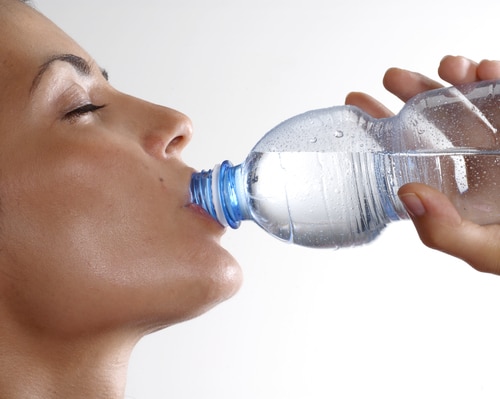 Your muscles need carbohydrates for fuel, but there’s something your body needs even more – water. Even a modest degree of dehydration can affect exercise performance. The problem is some athletes feel full and feel bloated when they drink fluids during a workout. This isn’t surprising since exercise slows down gastric emptying, the rate at which the stomach empties fluid, as blood is shunted away from the digestive tract to the hard-working muscles. Are there ways to stay hydrated during exercise without feeling full and bloated?
Your muscles need carbohydrates for fuel, but there’s something your body needs even more – water. Even a modest degree of dehydration can affect exercise performance. The problem is some athletes feel full and feel bloated when they drink fluids during a workout. This isn’t surprising since exercise slows down gastric emptying, the rate at which the stomach empties fluid, as blood is shunted away from the digestive tract to the hard-working muscles. Are there ways to stay hydrated during exercise without feeling full and bloated?
Don’t Wait Until You’re Thirsty to Start Drinking
Some athletes wait until they’re thirsty to start drinking. There are several problems with this approach. By the time you feel thirsty, you’re already down almost 2 liters of fluid. That’s enough to affect performance. At that point, you’ll have to play “catch up” and guzzle down even more fluid. Gastric emptying slows when you’re in a fluid-deprived state. That means all that fluid you’re drinking moves more slowly out of your stomach, and you feel full and bloated. Hydrate with small amounts of fluid throughout your workout to avoid having to drink too much fluid at once.
Watch What You’re Drinking
Beverages with a carbohydrate concentration of greater than 7% slow down gastric emptying. If you drink a sports drink, look for one with a carbohydrate concentration of no more than 7% to minimize gastric slowdown. In most cases, you don’t need a sports drink unless you plan on exercising for more than an hour. For workouts under an hour in duration, water is a suitable rehydration beverage, and it empties from the stomach more quickly than sports drinks and other beverages that contain carbohydrates.
What About Temperature of the Fluid You Drink?
Some fitness trainers advise not to drink cold beverages during exercise to avoid slowing down gastric emptying. According to a study published in the International Journal of Sports Nutrition and Exercise Metabolism, any effect temperature has on stomach emptying is small since cold liquids are warmed very quickly by the stomach. If you’re like most people, a cold beverage is more appealing, which means you’re more likely to drink it and stay hydrated.
Avoid Carbonated Beverages
Contrary to what some athletes believe, carbonation doesn’t appear to significantly slow gastric emptying. Still, carbonated drinks are more likely to cause bloating and fullness because they contain air. This can make it harder to exercise. In addition, drinking carbonated makes you feel fuller, which means you may end up drinking less. Avoid drinking carbonated drinks during a workout.
Other Factors That Affect Gastric Emptying
High-intensity workouts slow down gastric emptying more than moderate or low-intensity ones. Stress and temperature is a factor too. If you’re competing in an event, and you’re anxious or nervous, it can slow down how fast your stomach empties. That’s why it’s important to drink small amounts of fluid at frequent intervals so you won’t have to overhydrate later. Exercising in a hot environment also delays stomach emptying.
The Bottom Line?
Staying hydrated is critical for health and exercise performance. Drink small amounts of fluid throughout your workout to maximize stomach emptying and prevent fullness and bloating. Stick to water if your workout will be less than an hour in duration. If you plan on exercising longer and need a sports drink, choose a non-carbonated one that has a carbohydrate concentration of no more than 7%. If you enjoy sipping it ice cold, go ahead and do it. It’s unlikely to have a major impact on how fast your stomach empties.
References:
Advanced Sports Nutrition. Dan Benardot, Ph.D., FD, FACSM. 2006.
IJSNEM Volume 10, Issue 4, December
European Journal of Applied Physiology and Occupational Physiology.Volume: 58, Issue: 4, Pages: 433-439.
Related Articles By Cathe:
5 Common Truths & Myths about Drinking Water and Staying Hydrated
Are Colder or Room Temperature Beverages Better for Exercise Hydration?
Do You Really Need to Drink 8 Glasses of Water Daily?
Benefits of Drinking More Water and Tips for Making Sure You Do
Which Beverages Are Most Hydrating?
Hydration and Exercise Performance: What Happens When You Don’t Drink Enough Water?

